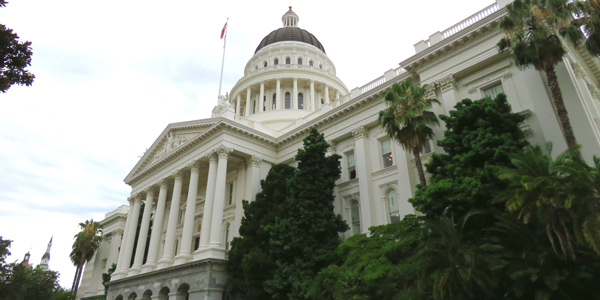By Jason Fordney
SAN DIEGO — Some states are creating energy policies without enough regard for grid reliability, possibly forcing federal regulators to intervene in the future, FERC Commissioner Robert Powelson said last week.

Powelson | © RTO Insider
“We are seeing states that are pushing the envelope in some of these market constructs, with no understanding of what this means to overall electric reliability,” Powelson told the Western Power Trading Forum (WPTF) on March 2. “It is pushing the RTOs and the ISOs to a very ‘back-to-the-wall’ scenario, and that’s not good.
“FERC is going to have to rightly interject itself into some of these states,” he said.
Powelson addressed the WPTF in an informal speech interjected with humor and endorsements of his beloved Philadelphia Eagles, the reigning Super Bowl champions.
He noted that California and states in New England are pushing more renewables onto the system, creating issues such as CAISO’s “duck curve” and forcing oil units to run during this winter’s “bomb cyclone” in ISO-NE. He also said that four years ago he would have laughed if someone told him that gas-fired units in some California zones would be coming to FERC for approval for reliability-must-run contracts. (See FERC Orders Hearing, Settlement Talks for Calpine RMRs.)
Other California issues that concern Powelson: the possible phase-out of the Aliso Canyon gas storage field, as well as the retirement of the San Onofre and Diablo Canyon nuclear power plants.
While Powelson said he respects states’ rights, he added that “in some of those cases, the states get to choose the winners and losers in those markets, but the FERC has to deal with the moral hazards created by those decisions.”
Organized markets are benefiting consumers, who are increasingly becoming “prosumers” through using technology such as smartphones to manage energy usage, Powelson said. States like Nevada are considering retail competition, penetration of renewables is growing and FERC is contributing through actions such as its recent order on energy storage, he noted. (See FERC Rules to Boost Storage Role in Markets.)
But states cannot consider the policy aspect without heavily considering system balancing and reliability, he said. He also suggested the industry more strongly promote organized market competition to state governors and leaders, and he discussed a “cooperative federalism model” for FERC.

California’s State Capitol Building | © RTO Insider
“There is a tectonic shift taking place across the ISO and RTOS, and a lot of that is driven by states,” Powelson said, pointing to the growth of markets across the West. “The fever of electric competition and competitive markets is going viral these days, and I think that’s a good thing.”
But he acknowledged there are differences in regional markets, “and you have to respect that, and I am learning that rather quickly.” He said, “I was warned not to talk about capacity markets” at the WPTF meeting, drawing laughter.
Powelson also mentioned the Department of Energy’s proposed grid resilience pricing rule that would have bolstered nuclear and coal units to maintain reliability, which he called “DOA.” (See Powelson, Regulators Talk Resiliency, Slam DOE NOPR.) He said that FERC’s rejection of the proposal shows that the rule of law and independence still matter at the commission.



